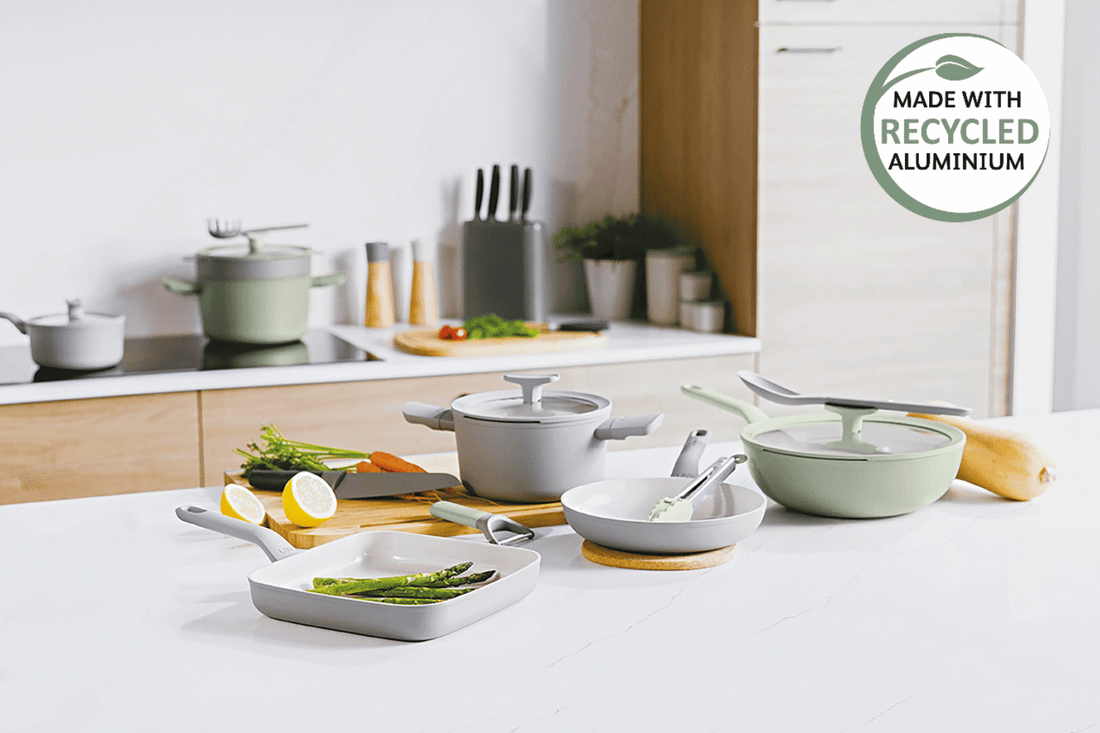We often get questions from our customers regarding our kitchen -and cookware products made with recycled materials. Are the performance properties the same for recycled non-stick cookware as for regular non-stick cookware? Do recycled products have the same composition as the virgin alternative? Are products made with recycled materials food grade approved? Why are recycled products more expensive than regular non-recycled products?
To give you a proper answer on above questions we generated a complete recycling process story of the main body materials used for kitchen -and cookware such as stainless steel, aluminium and plastics. from collecting, to washing, to shredding and melting. Let’s dive into the world of recycling.
Recycled aluminium cookware: extremely energy-efficient and effortless non-stick
Aluminium is known for its excellent heat distribution. It conducts heat faster than stainless steel cookware. Aluminium cookware is always combined with a non-stick coating and is therefore suitable for healthy cooking with a minimum of oil and guarantees easy food release. BergHOFF generally uses two types of coatings: a healthy and sustainable ceramic non-stick coating, called CeraGreen or a durable industrial non-stick coating, called FernoGreen. Both coatings have high-quality non-stick performances.
Aluminium is 100% recyclable. But keep in mind that since aluminium cookware requires a buffer coating, this non-stick coating needs to be removed before recycling. Save up to 95% of energy by recycling aluminium instead of the production of virgin aluminium. In general, recycled aluminum has the same quality and characteristics as any other item made from virgin aluminium.
The recycling process
Like in every recycling activity, the first stage of the recycling process is collection the aluminium scrap. This scrap comes from a variety of waste streams. But we distinguish two main types, often referred to as: pre-consumer scrap or post-consumer scrap.
Pre-consumer scrap (also known as industrial scrap, or post-production scrap), is surplus or discarded material that arises during the manufacturing and fabrication of aluminium products. Post-consumer scrap is material that has been used by consumers and subsequently discarded. For example: empty beverage cans, window frames, electric cabling, car cylinder heads, discarded aluminium cookware,… Nowadays we often see that post-consumer aluminium scrap from households, merchants,.. is collected to be recycled.
Pre-consumer scrap can be safely recycled by aluminium smelters because its composition and origin is traceable. This closed loop keeps waste out of landfills.
There is a different approach for post-consumer scrap, as aluminium smelters are not accepting post-consumer scrap as its origin is not traceable and the scrap can be contaminated. A specific sorting and cleaning process is therefore a recommended solution.
The scrap aluminum is crushed into bales and shredded into small pieces. Since aluminum is non-magnetic, contaminants from the shredded pieces can be removed using magnets.
Contaminated surfaces, such as non-stick coatings, will be removed through a gas-fired rotary furnace. After cleaning, the remaining pieces are melted down to purify the molten metal. The final product is an aluminum alloy with properties of virgin aluminum, with no loss of quality or performance.
Monitoring and testing
As recycled and virgin aluminium have the same quality and characteristics, recycled aluminium, is monitored in the same way as virgin aluminium for the production.
Cost of recycled aluminium kitchen- and cookware
Due to the complex recycling system, especially when coatings are involved as described above, the current cost of using recycled materials is higher than virgin materials.
This difference in cost will mostly disappear in the future as collection, sorting and recycling become more efficient and virgin materials become scarcer. However, the advantages of using recycled materials over virgin materials is that they do not need to be mined and therefore use less of our earth's resources and that recycling consumes 95% less energy compared to the production of virgin aluminium.
Read here more about recycled stainless steel and recycled plastics.







